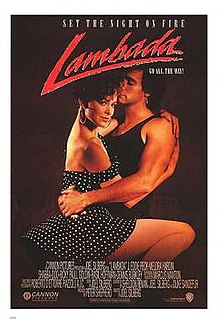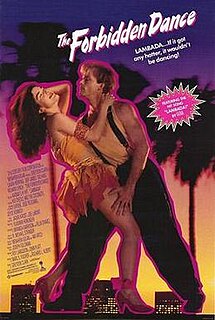See also
- Lambadi, people of India
- Lambda (disambiguation)
Lambada is a Brazil-origin dance that became popular worldwide during the 1980s and early 1990s.
Lambada may also refer to:
Alien primarily refers to:
Cinema may refer to:
More or Mores may refer to:
Romantic may refer to:
No may refer to one of these articles:
Motive(s) or The Motive(s) may refer to:

Lambada is a dance from State of Pará, Brazil. The dance became internationally popular in the 1980s, especially in the Philippines, Latin America and Caribbean countries. It has adopted aspects of dances such as forró, salsa, merengue, maxixe, carimbó and Bolivian saya.
Diving most often refers to:
Trust may refer to:

Lambada is a 1990 dramatic film starring J. Eddie Peck, Melora Hardin, Adolfo "Shabba-doo" Quiñones, Ricky Paull Goldin, Dennis Burkley, and Keene Curtis. Lambada was written and directed by Joel Silberg and choreographed by Shabba-Doo.
Malaika is a Swahili song written by Tanzanian musician Adam Salim in 1945. This song is possibly the most famous of all Swahili love songs in Tanzania, Kenya and the entire East Africa, as well as being one of the most widely known of all Swahili songs in the world. Malaika in this context means "angel" in Swahili, and this word has always been used by the Swahili speakers to refer to a beautiful girl.
Forbidden dance may refer to:

The Forbidden Dance is a 1990 drama film starring former Miss USA Laura Harring. Made to cash in on the Lambada dance craze by Menahem Golan's 21st Century Film Corporation, it opened on the same day as a similarly themed film, Lambada, produced by Golan's former company Cannon Films and his cousin, Yoram Globus.
Emily may refer to:

"Lambada", also known as "Chorando Se Foi (Lambada)" or "Llorando Se Fue (Lambada)", is a song by French-Brazilian pop group Kaoma. It featured guest vocals by Brazilian vocalist Loalwa Braz, and was released as the first single from Kaoma's debut album Worldbeat. The video, filmed on Cocos beach in the city of Trancoso, in the state of Bahia, Brazil featured the Brazilian child duo Chico & Roberta.
"Llorando se fue" is a Bolivian folk song recorded by Los Kjarkas in 1981 on the album Canto a la mujer de mi pueblo and released as a B-side of the "Wa ya yay" single in 1982. The song has been very popular in Latin America since the 1980s and has been covered several times. It obtained international fame with artists such as Wilkins in 1984, Argentine singer Juan Ramón in 1985, Brazilian singer Márcia Ferreira in 1986 and the French pop group Kaoma in 1989. Kaoma's cover "Lambada" was an unauthorized translation of the song and based on the music of Cuarteto Continental group and Márcia Ferreira's Portuguese version that led to a successful lawsuit against Kaoma's producers Olivier Lorsac and Jean Karakos. Recently, the song was adapted by several artists including Ivete Sangalo, Red Fox's "Pose Off", Jennifer Lopez for her 2011 single "On the Floor", Don Omar's "Taboo" and Wisin & Yandel's "Pam Pam".
Help may refer to:
"Stop, Listen, Look & Think" is a song by the American girl group Exposé. It was written and produced by the group's founder, Lewis Martineé, and can be found on their 1989 second album, What You Don't Know. It was the first single released by Exposé to feature Ann Curless on lead vocals. The song was also included on the soundtrack to the Lambada-themed film The Forbidden Dance, which was released in the U.S. in March 1990.
Thing or The Thing may refer to:
Total Recall may refer to: